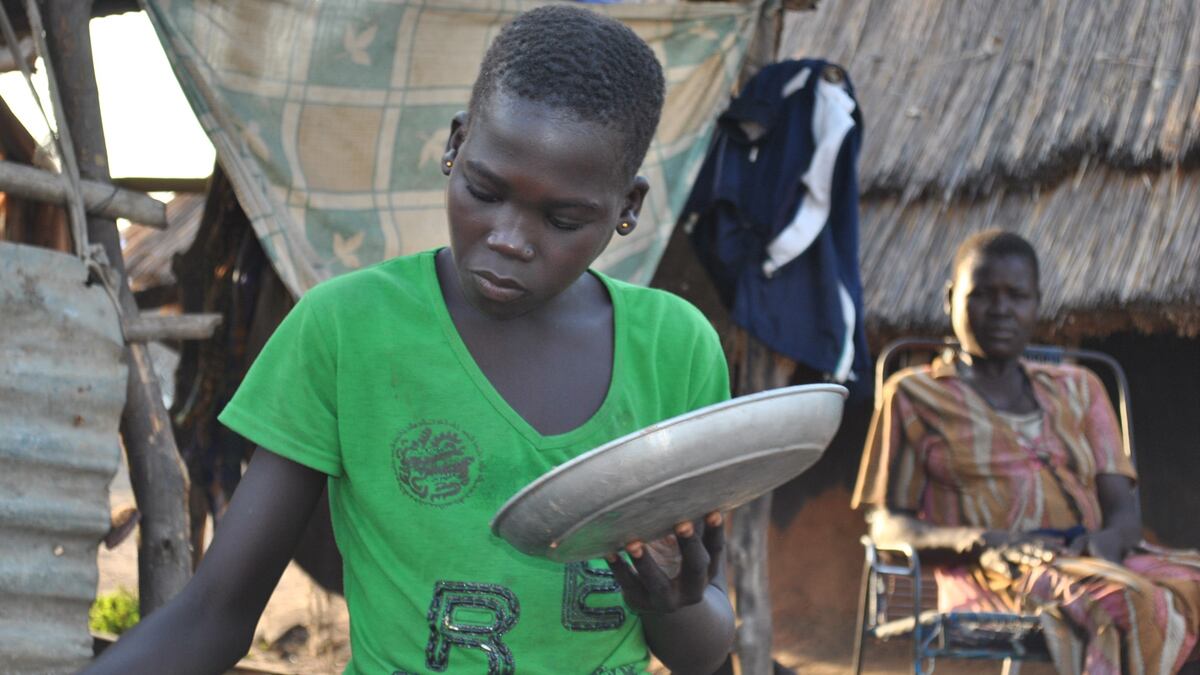Atia Odongi was 8 years old when her family gave her away. A crime had been committed in her town of Torit in South Sudan—Atia was selected to pay the price.

Atia’s brother had killed a man over a cattle dispute, so Atia was handed over to the man’s family as compensation. It’s a traditional practice in communities across her state of Eastern Equatoria in South Sudan, the country that became independent from Sudan in July 2011, after decades of civil war. For girls like Atia, their life becomes one of servitude and abuse, as the new families often harbor bitterness, taking revenge upon the girls they are given.
When Atia turned 9 years old, she was married to a son in her new family. When that man died of an illness, she was passed on to a younger brother. She spent her days scrubbing and cleaning—and being raped repeatedly by her new husband and other men in the family, with the intention of producing a child to replace the murdered family member. She was beaten if she fought back.
“I tried to kill myself twice,” says Atia, now 14 and still living in servitude.
Cattle are the economic mainstay for most communities in Eastern Equatoria; a young man cannot marry and build a homestead without them. A man must have at least 20 cows, costing 1,000 South Sudanese Pounds each (roughly $335), to win a woman’s hand in marriage. Desperate grooms end up conducting cattle raids to acquire sufficient numbers.
“Wherever there are high bride prices, there are cattle raids and violence. Girls end up paying the final price for it,” says Godfrey Victor Bulla, a local law student and journalist who runs an organization called Right to Information and Free Expression, which opposes the tradition. His organization conducted a survey of counties across the state, finding that the tradition of giving away girls was practiced in seven out of eight counties.
“Some of these areas in Eastern Equatoria are so isolated, they have continued the tradition for generations without anyone ever questioning it,” he says.
Following 22 years of civil war, many areas of South Sudan remain severely underdeveloped. According to South Sudan’s statistics bureau, only 19 percent of the population over the age of 15 is literate in Eastern Equatoria.
Amos Gudo, an elder chief who presides over a traditional court in an Eastern Equatoria village called Kiyala, says the practice of giving away girls must continue, as a way of solving conflicts between community members. He notes an absence of prisons in the state, inducing communities to keep relying on this tradition to resolve disputes.
Not all elders agree. A woman named Alima Biaka is devastated that her 16-year-old granddaughter, Igitu Imuta, was recently forced into marriage as compensation for a so-called blood feud. An uncle of Igitu’s had killed a man in a fight, promising the bereaved family his niece. Bewildered and frightened in her new family, Igitu has since vowed to take her own life, her grandmother said.
Now, that grandmother has decided to fight back. She has started campaigning with the local government and nongovernmental organizations, demanding her granddaughter’s release. “She is the only daughter I have left in this world, and I am not going to lose her,” she said.
Others within the Eastern Equatoria community support her. Lucy Iliha is the head of a state organization called the Women Civil Society Network. Along with Godfrey Victor Bulla, she is actively campaigning to stop the traditional practice, working with government officials and traditional leaders. Last month, she organized a demonstration with women’s groups across the state, calling on the state assembly to draft a law to forbid the practice.
It is an uphill battle, as some influential members of society continue the practice. In 2009, the state’s deputy governor gave one of his own family members to another family. Still, the activists are dedicated. “I promised myself to change this cycle of life,” said Victor Bulla. “One day we shall hopefully never have to recount the tragic stories of Atia and Igitu. Instead we will be discussing their marks at school.”
To get involved, contact Godfrey Victor Bulla at alkalinevictor@yahoo.co.uk.






